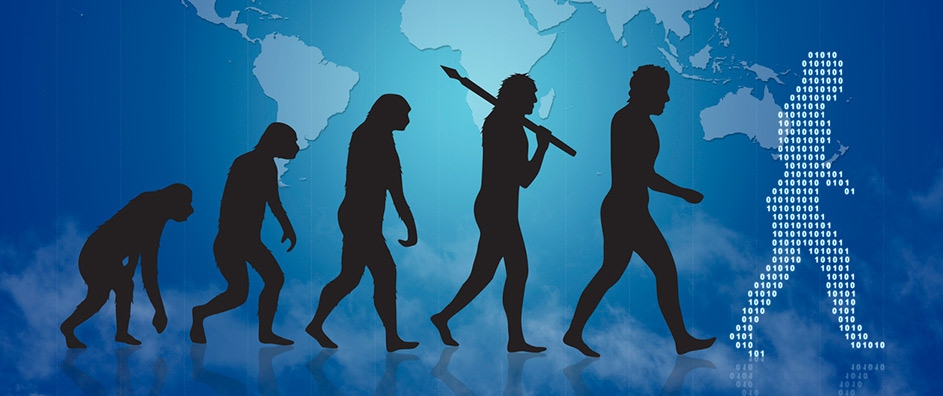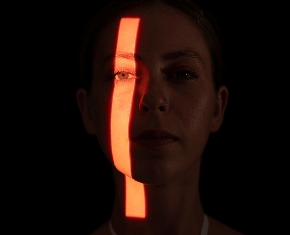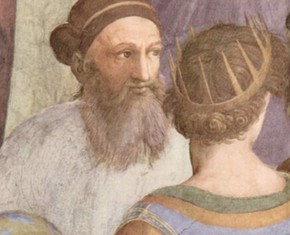The views expressed in our content reflect individual perspectives and do not represent the authoritative views of the Baha'i Faith.
Did evolution program human beings to believe in God?
During his promotion of the proposition that science refutes God during the Intelligence Squared debate, physicist Lawrence Krauss stated the following:
Human beings were clearly programmed by evolution to impute intentionality to the world around them. Meaning and purpose was infused in all everyday events to make sense of a dangerous, difficult, and uncaring world, so we had rituals behind the sun, the moon, the planets, the wind, the earth, the oceans, in all societies. The rise of our physical understanding has slowly caused us to do away with those many gods… Science has taught us that instead of capricious beings, there’s an order to nature, and that order does not appear to involve a divinity. (emphasis added)
As anyone who has ever worked with computers knows, programming doesn’t just randomly occur—it is an act that requires intention. Krauss and the atheist viewpoint he represents ask us to believe that a process with neither a rational intelligence nor intention somehow imbues one type of creature out of the billions on the planet with both. He puts this idea in passive terms (“purpose was infused”) so that there seems to be no active infuser, but reason and logic dictate that if purpose was infused, someone or something must have done the original infusing.
The fact that human beings are the only creatures who infuse life with meaning is not explained by the simple expedient of claiming that we were programmed without a programmer, or that we learned to infuse meaning without a faculty that does the infusing and someone to give instruction in its use.
Abdu’l-Baha commented on this exact point during his meeting with a group of free thinkers in San Francisco in 1912:
If it be claimed that the intellectual reality of man belongs to the world of nature—that it is a part of the whole—we ask is it possible for the part to contain virtues which the whole does not possess? For instance, is it possible for the drop to contain virtues of which the aggregate body of the sea is deprived? …Is it possible that the extraordinary faculty of reason in man is animal in character and quality? On the other hand, it is evident and true, though most astounding, that in man there is present this supernatural force or faculty which discovers the realities of things and which possesses the power of idealization or intellection. It is capable of discovering scientific laws, and science we know is not a tangible reality. Science exists in the mind of man as an ideal reality. The mind itself, reason itself, is an ideal reality and not tangible. – The Promulgation of Universal Peace, p. 451. (emphasis added)
Actually, though, I appreciate Krauss invoking the concept of a “rise in physical understanding.” The distinction is important because it draws into question a key assumption that Krauss makes: that a purely physical understanding of the universe is the only understanding either possible or valuable.
The fact that we’re engaged right now in a conversation about non-physical realities seems to undermine that supposition. This conversation is where a great many of us live. We spend more time considering intangibles than we do our most critical physical needs, such as what we will eat. For most people, these things have become secondary to the activities they use food to fuel—chiefly, thought about non-tangibles.
I spend most of my time telling stories, pondering and writing about non-tangibles. So do a great many other people, including Lawrence Krauss and his theistic counterpart in the original Intelligence Squared debate, physicist Ian Hutchinson. Ironically, the entire body of New Atheist literature, penned by individuals like Richard Dawkins, Sam Harris and the inimitable Christopher Hitchens, is about intangibles from beginning to end—and yet they deny the existence of any supreme intangible.
Those New Atheists tell stories the purpose of which is to tell us we have no purpose—a conundrum I’d like to consider further in the next essay in this series. Meanwhile, meditate for a moment on this passage from the Baha’i teachings, which indicates that we humans have a bigger and more profound purpose than we know:
If man did not exist, the universe would be without result, for the purpose of existence is the revelation of the divine perfections. – Abdu’l‑Baha, Some Answered Questions, newly revised edition, p. 227.
















Comments
Sign in or create an account
Continue with Googleor